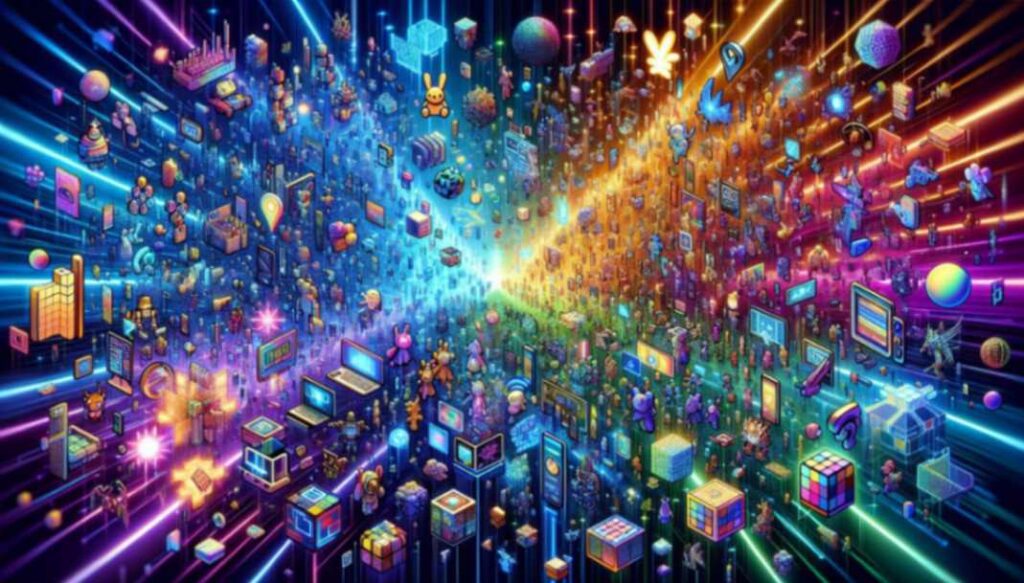
In the face of market volatility and uncertainty, one big question looms: Are NFTs dead? This article examines speculation to examine the current state and emerging trends within the NFT ecosystem, revealing a landscape where innovation continues amidst challenges.
Main sockets
-
The NFT market is facing decline and saturation, but continues to show signs of activity and innovation, including branching out into areas such as asset tokenization and NFT-based loans.
-
While the initial hype around NFTs is fading, they are increasingly being adopted for practical uses in various industries, such as art, gaming, and collectibles, and moving toward more stable growth.
advertisement
-
NFTs are evolving with new use cases and technologies, despite facing environmental and economic scrutiny, highlighting the mix of risks and potential rewards for investors and creators in the digital collectible space.
Read more: The 5 Most Expensive NFT Deals: A Glimpse into the Riches of the Digital Asset
Checking the NFT Pulse: Assessing the Vital Signs of Non-Fungible Tokens

The NFT market has seen a major decline. Many NFTs have seen a significant drop in value after their initial rise. According to a report by dappGambl, 95 percent of NFTs will not be sold at all today, indicating an increase in supply compared to demand. The market is saturated, but that does not mean it is inactive.
Despite the decline, the NFT ecosystem continues to thrive, with new entrants entering the space, driven by celebrity endorsements and the novelty of digital ownership. However, some major factors such as the collapse of Terra Luna, the FTX failure, the decline in the value of the cryptocurrency, and changing global economic conditions, contributed to the market decline.
The reality of the hype cycle: Beyond the initial excitement
The initial excitement around NFTs may be waning, but that doesn't mean the NFT world is disappearing. According to the Gartner Hype Cycle, NFTs may move from the “trough of disillusionment” to the “slope of enlightenment” stage. At this stage, technologies often see a more moderate and steady growth in adoption, characterized by an increase in pilot projects and a focus on benefiting specific enterprise applications.
This shift in the NFT space means that the acquisition of NFTs is shifting towards more tangible reasons. People are now acquiring NFTs to:
This shift is a clear sign that the future of NFTs lies beyond the initial hype and excitement.
Market dynamics: saturation versus innovation
The rapid increase in the number of NFT creators and investors has led to market saturation. This saturation makes it difficult for individual pieces to stand out, and the vast majority of NFT collections get lost in the crowd. The abundance of NFTs, including those of questionable quality, has made it difficult for collectors to find valuable pieces, leading to a perception of dilution in the space.
While saturation is challenging, there is innovation happening too. NFT-based loans and tokenization of assets such as real estate provide new revenue streams within the NFT ecosystem. This innovation is a testament to the flexibility and potential of the NFT market.
A closer look at NFT use cases
NFTs serve more than just a means of digital ownership; They have practical applications in various industries, including art, toys, and collectibles. The diverse use cases for NFTs are a testament to their versatility and potential.
Let's take a closer look at how NFTs are used in different regions.
Digital art and collectibles
In the world of NFT digital artwork, NFTs have made a huge impact. They bring digital scarcity to the art world, enabling artists to:
-
Create unique, limited-edition pieces verified on the blockchain
-
Monetizing their art in a new way
-
Give collectors the opportunity to invest in unique digital assets
NFTs have revolutionized the way digital art is bought, sold, and collected in the digital world, giving rise to a thriving market for NFT collectibles and increasing NFT sales.
Companies like NBA Top Shot and marketplaces like OpenSea have been pioneers in selling digital collectibles through NFTs. These transactions often require cryptocurrencies such as Ether, which increases the integration between the NFT and the cryptocurrency market.
Music and entertainment
The music and entertainment industry is another area where NFTs are making a huge impact. NFTs in music can represent ownership of digital music files, exclusive merchandise, and live performance recordings. This use of NFTs provides artists with new revenue models and offers fans unique experiences.
Artists can share royalties from their music with fans through NFTs, creating a new revenue model for both parties. They can also offer limited edition or unreleased songs, concert tickets, and merchandise through NFTs. These new models of engagement and revenue streams are transforming the music and entertainment industry.
Read more: The Ultimate Guide to Cryptocurrency Drops: Everything You Need to Know
Real estate and virtual worlds
Real estate and virtual worlds are other areas where NFTs are making their mark. NFTs enable investment, trading, and verification of unique ownership in digital real estate and asset transactions within digital worlds. This use of NFTs creates unique investment opportunities and enhances user engagement.
In gaming and virtual economies, NFTs foster deeper player engagement by enabling them to own, sell, and profit from in-game assets. By integrating augmented and virtual reality technologies with NFTs, user experiences in the creative industries can be transformed.
Environmental Considerations and NFT Longevity
While NFTs are reshaping many industries, they are not without their environmental impact. The energy consumption of blockchain networks, which support NFTs, has led to increased scrutiny and may impact demand. NFTs contribute to greenhouse gas emissions and climate change due to the energy use of the technology they rely on.
There is also the issue of electronic waste generated by blockchain devices that have become old or worn out due to constant use. However, there are initiatives underway to mitigate these concerns. Renewable energy sources and efforts to recycle e-waste from blockchain operations can reduce the environmental impact of blockchain mining and hardware recycling.
Investment Perspective: Balancing Risk and Reward
Investing in NFTs comes with risks but also potential. Speculative behavior in the NFT market has led to price fluctuations, with an emphasis on quick returns rather than long-term support for creators. The value of digital collectibles is subject to high volatility and depends on market demand.
Broader economic pressures, such as rising inflation and the cost of living, have prompted a more cautious approach to investing in speculative assets such as NFTs. Despite these risks, NFTs continue to offer potential revenue streams, underscoring the need for a cautious but open approach to investing in the NFT market, taking into account real demand.
The evolution of technology and society in the field of NFT
The NFT field continues to evolve, driven by technological advancements and community growth. Blockchain technology, especially Ethereum Blockchain has reduced energy consumption by moving to a proof-of-stake mechanism. There is an active initiative within blockchain communities to create more eco-friendly NFT protocols, addressing environmental concerns.
New monetization strategies are also emerging, including tokenizing personal data, which can be sold as non-fungible tokens (NFTs). Alongside these developments, the NFT space has seen a surge in community growth, driven by growing interest from artists and creators interacting directly with their audiences, streamlining distribution and monetization.
NFT novels: separating fact from fiction
Despite the challenges the NFT market faces, it is essential to separate fact from fiction. Ordinals and other Bitcoin NFT pools have seen trading volume and market share rise, demonstrating the continued vitality in the space. The recent surge in innovation and development within the Bitcoin network has had a positive impact, particularly in the booming Bitcoin NFT sector.
There is a cultural shift underway that embraces the concept of digital ownership, laying the foundation for continued interest in and adoption of non-fungible tokens (NFTs). Despite market challenges, ongoing innovation and cultural shift suggest that NFTs are not dead but are continuing to evolve and find new applications.
summary
In short, the NFT market has seen a major shift from the initial hype towards more sustainable and meaningful applications. Despite challenges such as market saturation and environmental concerns, the continued innovation and community growth within the NFT space indicates a promising future. The narrative that NFTs are dead is far from the truth. Instead, they continue to evolve, reshaping various industries, and forging a new path in the digital world.
Frequently asked questions
Are NFTs dead?
No, NFTs are not dead. The NFTs market continues to evolve and find new applications despite declining value and demand.
What is the current state of the NFT market?
The NFT market has seen a decline in value and demand due to factors such as market saturation, environmental concerns, and broader economic pressures.
What are some practical applications for NFTs?
NFTs have practical applications in digital art, music, entertainment, and real estate. They are used in various industries to represent ownership of digital assets.
What is the environmental impact of NFTs?
NFTs have a significant environmental impact, contributing to greenhouse gas emissions, climate change, and e-waste due to the energy consumption of the blockchain technology they rely on. This is a worrying issue that requires attention and study.
What are the risks and rewards of investing in NFTs?
Investing in NFTs carries risks due to market volatility and economic pressures, but also offers potential revenue streams and unique investment opportunities. Think carefully before investing.
Disclaimer: This article is for informational purposes only and should not be considered financial or investment advice. Cryptocurrency investments are subject to market risks, and readers should conduct their own research and consult with professionals before making any investment decisions. Chain News Network is not responsible for any market losses.
advertisement
